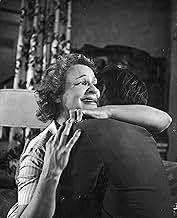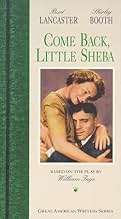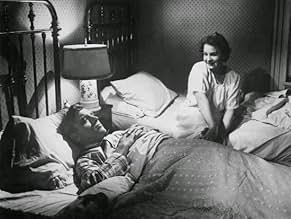AVALIAÇÃO DA IMDb
7,5/10
5,6 mil
SUA AVALIAÇÃO
Um alcoólatra em recuperação e sua esposa sem ambição enfrentam uma crise pessoal quando recebem um inquilino atraente.Um alcoólatra em recuperação e sua esposa sem ambição enfrentam uma crise pessoal quando recebem um inquilino atraente.Um alcoólatra em recuperação e sua esposa sem ambição enfrentam uma crise pessoal quando recebem um inquilino atraente.
- Ganhou 1 Oscar
- 7 vitórias e 8 indicações no total
Robert Fuller
- Extra
- (não creditado)
Ned Glass
- Man at AA Meeting
- (não creditado)
William Haade
- Hospital Intern
- (não creditado)
Virginia Hall
- Blonde in Diner
- (não creditado)
Anthony Jochim
- Mr. Cruthers
- (não creditado)
Peter Leeds
- Milkman
- (não creditado)
Kitty McHugh
- Pearl Stinson - AA Member
- (não creditado)
Paul McVey
- Postman
- (não creditado)
Beverly Mook
- Judy Coffman
- (não creditado)
Virginia Mullen
- Henrietta Colby - AA Member
- (não creditado)
- Direção
- Roteiristas
- Elenco e equipe completos
- Produção, bilheteria e muito mais no IMDbPro
Avaliações em destaque
This film is as powerful as when I first saw it as a teenager. One would think that after 50 years, the material would seem dated. But in fact, a lot of what was said then, seems even more relevant today. Inge is unfortunately a very underrated writer. He seemed to respond to things on a much more emotional level than many of his contemporaries and this is why his material has not lost interest. His plays never seem to go to an intellectual level. He wrote about what he knew and didn't try to be something he wasn't. Are there really Blanche DuBois and Willie Lomans today? Just listening to those plays, as wonderful as they might be, is something we can no longer relate to. But there will always be Lola Delaneys. Everyone knows a few of them. The film was obviously made on a very tight budget and we are lucky for that. Imagine how it would have been had they cast Rosiland Russell and Jimmy Stewart. Though Burt Lancaster was miscast, the simple fact that he was a great actor, means his performance comes off amazingly well. And what more can be said about Booth, except the extreme regret we who never saw her in the play onstage must feel. The power of that performance is beyond description. Anyone who likes this movie should try to get hold of the new recording of the musical version. It was obviously written by people with tremendous love and respect for Inge's work.
Burt Lancaster, Shirley Booth, and Terry Moore shine in this very fine flick. In watching it, if you know anything at all about denial, projection, alcoholism, and Alcholics Anonymous, this is a wonderful telling of the psychological and spiritual truths behind the disease. Certain attitudes and comments, projected so well by both Booth and Lancaster, along with the innocent bystander Moore, are dead on. The activities of the men who come to deal with Lancaster while he is in his cups are straight out of the "Big Book". And the resultant coming to grips with the thing, a turn around in out look, are perfect examples of "progress, not perfection" and "having had a spiritual awakening". For the plot, the great acting ability, the talent both in front of and behind the camera, and, for me anyway, the psychology of the thing, it just doesn't get much better than this.
Shirley Booth was 54 when she won the Academy Award as Best Actress for her performance as Lola in the screen version of William Inge's "Come Back, Little Sheba". It was also her screen debut in a role that had previously won her a Tony on the stage and, quite frankly, she was magnificent. It launched her on a short-lived movie career and a slightly longer career on television. It's a fine film, well directed by Daniel Mann and adapted by Ketti Frings and it has three other good performances from Burt Lancaster as the alcoholic Doc, Terry Moore as the young lodger who, unwittingly, is the cause of Doc's hitting the bottle again and Richard Jaeckel as the athletic stud Moore is dallying with. Admittedly Lancaster, who at 39 was 15 years younger than Booth, isn't really right for his role, (he was too young for starters), but he handles it very effectively. Nevertheless, this is Booth's show. If she had never done anything else on screen she would still have earned her place in the pantheon of great performances.
Days of Wine and Roses and The Lost Weekend deal with the problem of those afflicted with Alcoholism. Both are fine films. This movie is better than those two and that's only part of the story in this picture. Shirley Booth gives a most certainly well deserved Academy Award winning performance as the wife of a recovering alcoholic husband. Burt Lancaster in a role he is not often remembered for is the husband. A once proud and respected person who falls by the wayside due to his drinking has picked himself up and is determined to start over again even though various demons still linger inside him. I first saw this motion picture on New Years eve back in the late 60's on NBC's Saturday Night at the Movies. During the week preceding the showing NBC advertised it with the clip of Lancaster going after Booth with a kitchen knife. My older sibling and I not really old enough to know about such things joked about the scene. When we watched the movie and it came to that part we were no longer joking. I didn't see it for many years until it aired on AMC. The film is as powerful today in its story and it's acting performances as when I first saw it and I'm certain when it was first released in 52. A must see.
This is an interesting study about the trials of people dealing with disappointment and alcoholism. Lost dreams have been Doc's excuse for turning to the bottle, and a lost little dog (Sheba) symbolizes his wife's search for herself.
The film based on the play is an early study of the pain of addiction. As Doc tells his wife, "Dreams are strange." There is redemption in the fact that Doc asks for forgiveness as his wife regains her sense of dignity.
Booth gives a very believable performance, and Lancaster is excellent playing a man far older than he was at the time. This is a touching, though simplistic, look at the dark side of human nature.
The film based on the play is an early study of the pain of addiction. As Doc tells his wife, "Dreams are strange." There is redemption in the fact that Doc asks for forgiveness as his wife regains her sense of dignity.
Booth gives a very believable performance, and Lancaster is excellent playing a man far older than he was at the time. This is a touching, though simplistic, look at the dark side of human nature.
Você sabia?
- CuriosidadesShirley Booth's movie debut.
- Erros de gravaçãoWhen Doc takes the bottle from the kitchen cabinet, inexplicably there is no knob on the left hand door. When Lola opens the cabinet to check on the bottle, the knob is there and she uses it to open the same door.
- Citações
Doc Delaney: Alcoholics are mostly disappointed men.
Lola Delaney: Sure, I know.
[pause]
Lola Delaney: You was never disappointed, were you, Doc?
- ConexõesFeatured in Film Review: Burt Lancaster (1968)
Principais escolhas
Faça login para avaliar e ver a lista de recomendações personalizadas
- How long is Come Back, Little Sheba?Fornecido pela Alexa
Detalhes
- Data de lançamento
- País de origem
- Idioma
- Também conhecido como
- Come Back, Little Sheba
- Locações de filme
- Empresa de produção
- Consulte mais créditos da empresa na IMDbPro
- Tempo de duração1 hora 39 minutos
- Cor
- Proporção
- 1.37 : 1
Contribua para esta página
Sugerir uma alteração ou adicionar conteúdo ausente





































